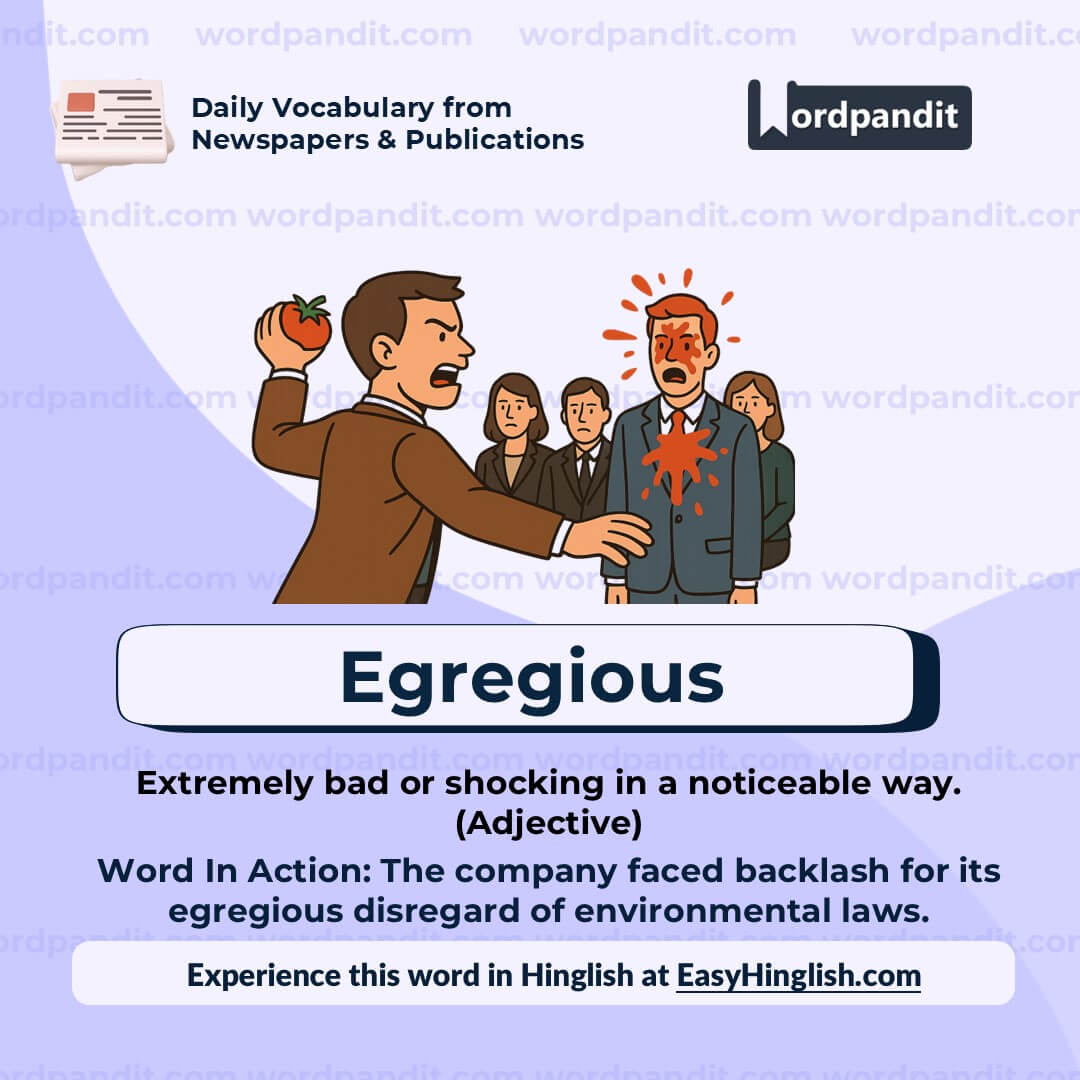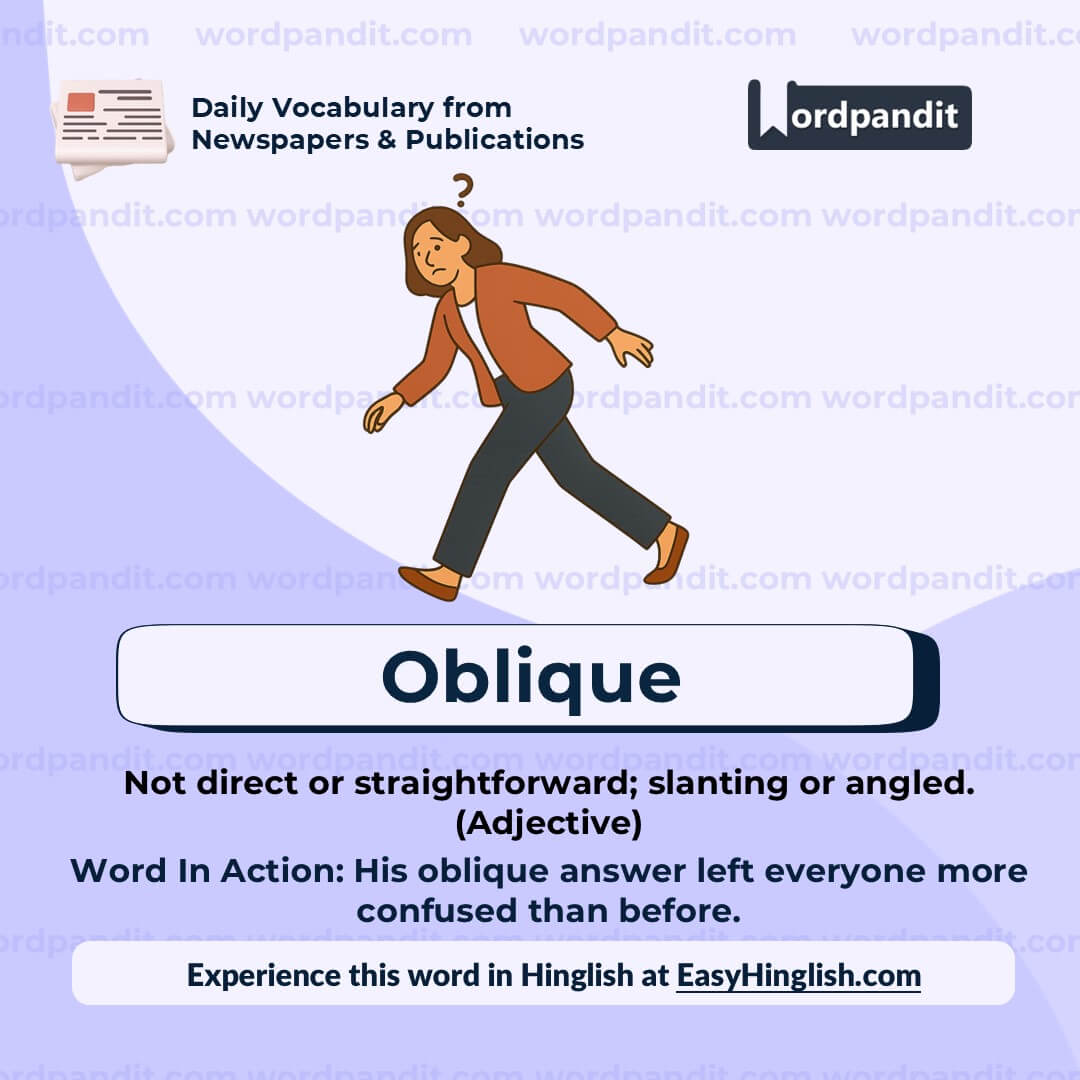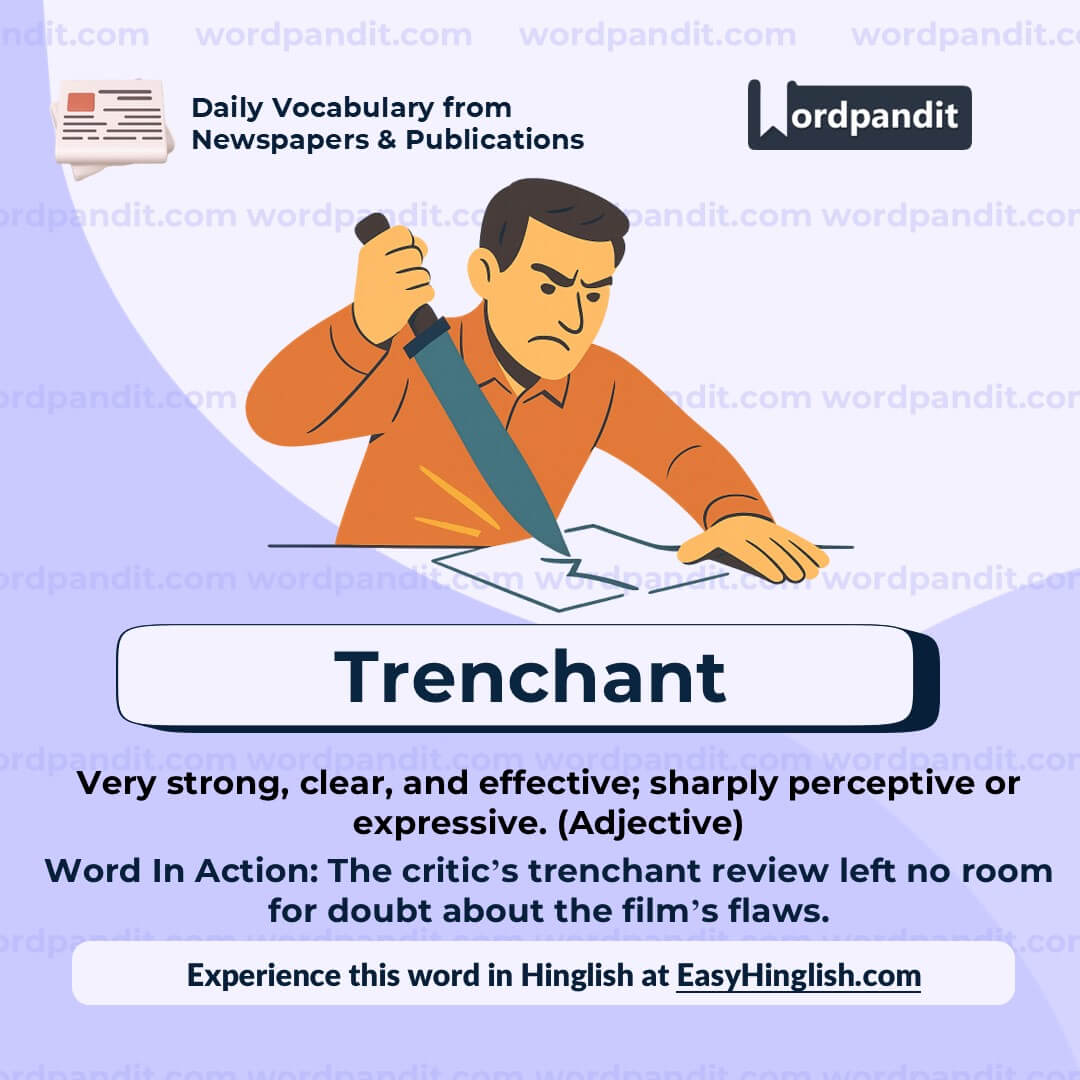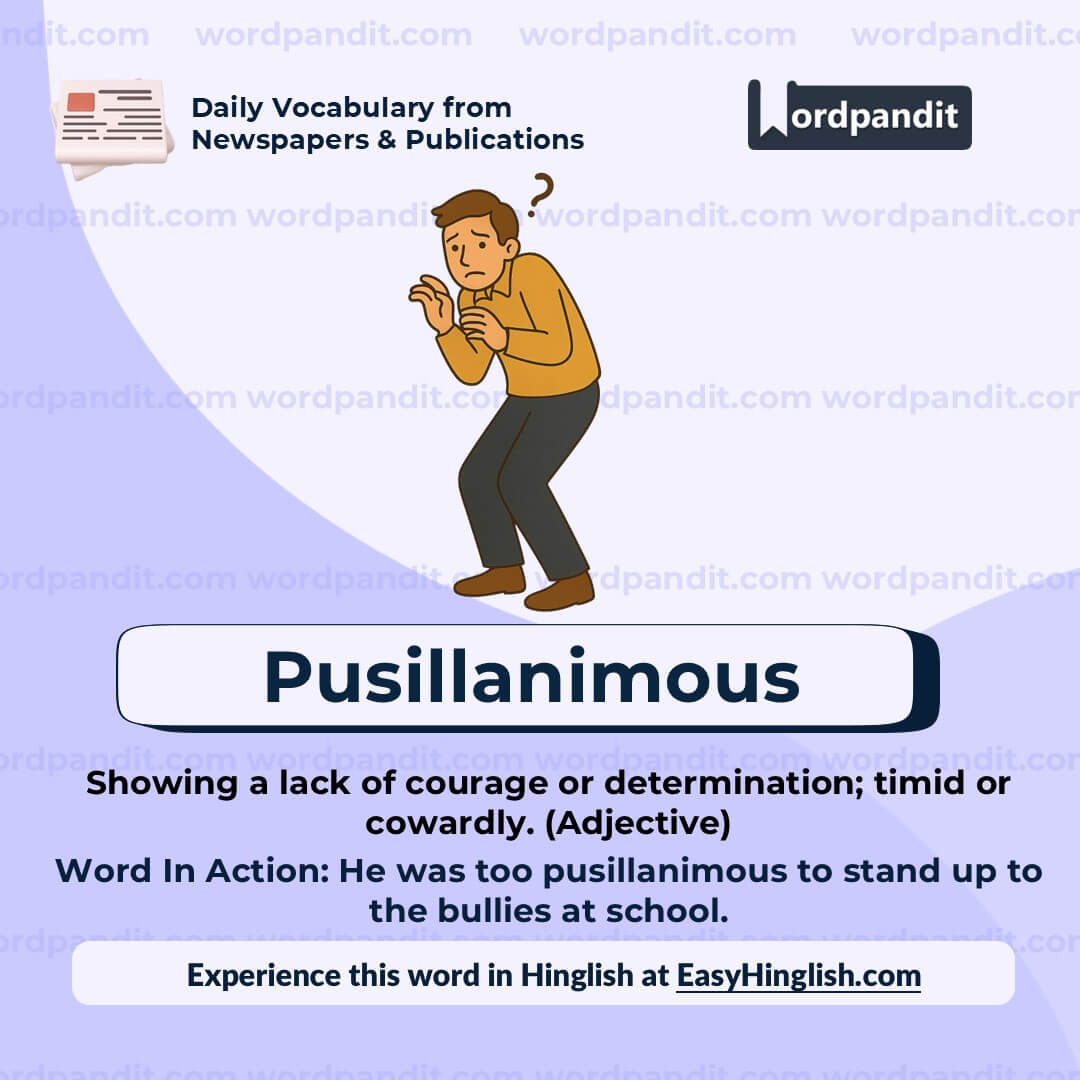Daily Vocabulary from Indian Newspapers and Publications
Welcome to Wordpandit’s Indian Vocabulary Hub
At Wordpandit, we understand the importance of staying rooted in the local context while expanding your language skills. This section focuses on enriching your vocabulary with words and phrases drawn from India’s leading newspapers and publications, ensuring you're learning vocabulary that is practical, relevant, and uniquely Indian.
Why Indian Sources Matter
We believe that the best way to master any language is by immersing yourself in local content. That’s why we carefully curate vocabulary from top Indian publications, including:
- The Hindu
- The Times of India
- The Economic Times
- Hindustan Times
- Live Mint
- The Indian Express
- And many others...
Stay Updated, Stay Relevant
With daily updates from Indian news sources, you’ll be consistently learning words that reflect the trends and shifts in Indian society and culture. Our focus is to provide vocabulary that enhances your understanding of the language in an Indian context.
How Wordpandit Supports Your Goals
Whether you’re preparing for exams, aiming to improve your professional communication, or simply want to stay connected with the latest Indian vocabulary, Wordpandit is here to guide you every step of the way.
Learn with a Practical Approach
Our interactive learning methodology includes real-world examples, engaging activities, and context-specific usage to ensure that every word becomes part of your active vocabulary.
Dive into Indian Vocabulary Today!
Why Choose Wordpandit?
Practical Learning: Focus on words you'll actually encounter in real-world reading, enhancing your comprehension and communication skills.
Diverse Content: From current affairs to scientific breakthroughs, our varied sources expose you to vocabulary across multiple domains.
Effortless Integration: Make Wordpandit a part of your daily routine. Just a few minutes each day can significantly boost your lexicon over time.
Your Path to Vocabulary Mastery
- Visit our Daily Vocabulary section regularly
- Explore new words and their usage in context
- Practice incorporating these words into your own writing and speech
- Track your progress as your vocabulary expands
Start Your Journey Today
Embark on your vocabulary enhancement journey with Wordpandit. By consistently engaging with our daily posts, you'll build a robust vocabulary that serves you well in academic, professional, and personal contexts.
Remember, a word a day keeps linguistic limitations at bay. Make Wordpandit your daily companion in the quest for vocabulary excellence!
WORD-1: Egregious
Context:
"The most egregious example of this policy failure can be seen in the persistent flooding that has plagued urban centers despite years of infrastructure promises." - The Hindu
Explanatory Paragraph:
“Egregious” is a strong word used to describe something that is shockingly bad or glaringly wrong. It often refers to errors, misjudgments, or behaviors that stand out because of their severity or obviousness. When someone calls a mistake egregious, they’re not talking about a minor slip-up — they mean it's a serious failure that is hard to ignore.
Meaning: Outstandingly bad; shocking (Adjective)
Pronunciation: ih-GREE-jus
Difficulty Level: ⭐⭐⭐⭐ Advanced
Etymology: From Latin *egregius* meaning “distinguished” or “eminent,” originally used in a positive sense but gradually took on a negative connotation.
Prashant Sir's Notes:
This word is powerful when highlighting extreme faults or violations — use it sparingly to emphasize truly unacceptable actions or decisions. Common in journalistic and academic critiques.
Synonyms & Antonyms:
Synonyms: outrageous, flagrant, atrocious, shocking, deplorable
Antonyms: minor, slight, trivial, subtle, negligible
Usage Examples:
- The referee's egregious error cost the team a chance at the championship.
- It was an egregious violation of human rights that drew international criticism.
- The company apologized for the egregious oversight in its safety protocols.
- Such egregious behavior from a public official demands immediate accountability.
Cultural Reference:
"Egregious abuses of power tend to occur when oversight is weak and accountability is absent." — A common theme in political discourse and investigative journalism.
Think About It:
Can calling something "egregious" shift public perception more than just labeling it as "wrong"? Why do certain words carry more emotional weight?
Quick Activity:
Think of a recent news story or incident you felt was shocking. Describe it in one sentence using the word "egregious."
Memory Tip:
Think: “Egregious = Extra Grievous” — it’s not just bad, it’s painfully bad.
Real-World Application:
The word "egregious" is frequently used in journalism, legal discussions, and critical reviews to underscore severe errors or wrongdoings, such as policy failures, corruption, or professional misconduct.
WORD-2: Perfunctory
Context:
"The investigation into the matter was perfunctory at best, failing to address key evidence that could have changed the outcome." - The Wire
Explanatory Paragraph:
“Perfunctory” describes something done with minimal effort, interest, or attention — often just for the sake of getting it done. It suggests a lack of thoroughness, enthusiasm, or care. If someone completes a task in a perfunctory way, they are going through the motions rather than genuinely engaging with the task.
Meaning: Done with little interest or care; superficial (Adjective)
Pronunciation: per-FUNK-tuh-ree
Difficulty Level: ⭐⭐⭐ Intermediate
Etymology: From Latin *perfunctorius*, meaning "careless, negligent", derived from *perfungi* – to get through or perform.
Prashant Sir's Notes:
Use "perfunctory" to highlight a lack of depth or seriousness in someone's actions, especially when something important is being taken lightly. A great word for essays criticizing bureaucracy or hollow formalities.
Synonyms & Antonyms:
Synonyms: superficial, cursory, mechanical, routine, indifferent
Antonyms: thorough, attentive, careful, detailed, thoughtful
Usage Examples:
- Her apology felt perfunctory, as if she didn’t truly mean it.
- The employee gave a perfunctory glance at the documents before signing them.
- The inspector’s perfunctory visit missed several major safety violations.
- He greeted the guests with a perfunctory nod and quickly walked away.
Cultural Reference:
In many corporate or governmental settings, audits or reviews can sometimes become perfunctory exercises — performed more for the record than for real scrutiny. This critique appears in films like *The Big Short* (2015), where regulatory bodies are shown to go through the motions while missing looming crises.
Think About It:
What are the risks of approaching critical tasks in a perfunctory manner, especially in fields like medicine, law, or journalism?
Quick Activity:
Write down three tasks you usually complete in a perfunctory way. How might you approach them differently to make them more meaningful?
Memory Tip:
Perfunctory = “Perform + Factory” → like a robot in a factory just performing tasks without thought or care.
Real-World Application:
The word “perfunctory” is useful when critiquing shallow efforts — from customer service to political responses — especially when something deserves deeper attention. Ideal for essays and analysis on systemic issues.
WORD-3: Oblique
Context:
"The minister made oblique references to corruption in the previous administration without directly naming any officials." - Indian Express
Explanatory Paragraph:
“Oblique” is used to describe something that is indirect or not stated clearly. When someone communicates in an oblique manner, they avoid being straightforward and instead hint or suggest something subtly. It can also mean slanting or angled in physical terms, but in language and tone, it refers to evasiveness or subtlety.
Meaning: Indirect or not expressed in a straightforward way; slanting (Adjective)
Pronunciation: oh-BLEEK / uh-BLEEK
Difficulty Level: ⭐⭐⭐ Intermediate
Etymology: From Latin *obliquus*, meaning "slanting, sideways, indirect."
Prashant Sir's Notes:
Oblique is a great word to describe evasive communication — especially in politics, diplomacy, or literature. Watch out for contexts where clarity is avoided intentionally.
Synonyms & Antonyms:
Synonyms: indirect, vague, roundabout, evasive, implied
Antonyms: direct, explicit, straightforward, clear, candid
Usage Examples:
- She gave an oblique response, avoiding a clear answer to the question.
- The novel uses oblique symbolism to comment on social injustice.
- His oblique angle made it hard for the defense to block his shot.
- They made oblique accusations without offering any evidence.
Cultural Reference:
In George Orwell’s *1984*, the government often used oblique language to manipulate public understanding — a technique now famously associated with "doublespeak" and ambiguous messaging.
Think About It:
Why do people often choose oblique communication over direct speech? Is it a sign of diplomacy, fear, or manipulation?
Quick Activity:
Write a sentence that criticizes something obliquely, without directly naming or stating the object of criticism.
Memory Tip:
Oblique = “Oh be leak!” → The truth is leaking out, but not directly — it’s hinted or slanted.
Real-World Application:
“Oblique” is useful in political analysis, literature reviews, and interpersonal communication contexts where indirectness plays a role. It helps describe subtle messaging or evasive speech patterns.
WORD-4: Trenchant
Context:
"Her trenchant criticism of the government's environmental policies has earned her both admirers and powerful enemies." - Scroll
Explanatory Paragraph:
“Trenchant” refers to speech or writing that is sharp, incisive, and effective — often with a critical or cutting edge. When someone gives a trenchant analysis or remark, it’s not just strong; it’s clear, focused, and leaves a lasting impact. It usually conveys insight paired with forcefulness, especially in arguments or critiques.
Meaning: Sharply effective, insightful, and often critical (Adjective)
Pronunciation: TREN-chunt
Difficulty Level: ⭐⭐⭐⭐ Advanced
Etymology: From Old French *trenchant*, meaning “cutting,” from the verb *trenchier*, meaning “to cut.”
Prashant Sir's Notes:
Use “trenchant” to describe arguments or commentary that really hit the mark — especially when something is not only correct, but also forcefully and eloquently expressed. Great for editorials, essays, and debates.
Synonyms & Antonyms:
Synonyms: incisive, sharp, biting, cutting, penetrating
Antonyms: vague, dull, weak, bland, superficial
Usage Examples:
- His trenchant remarks on the education system sparked widespread debate.
- The critic’s trenchant review exposed the film’s lack of originality.
- She’s known for her trenchant insight into political affairs.
- Even his allies were taken aback by the trenchant tone of his speech.
Cultural Reference:
Trenchant commentary is a hallmark of prominent figures like Arundhati Roy and Noam Chomsky, whose critiques are both intellectually rigorous and emotionally compelling.
Think About It:
Can trenchant criticism help reform a system, or does its sharpness risk alienating those who need to hear it most?
Quick Activity:
Write a trenchant sentence critiquing a popular social trend or policy — be bold, clear, and specific.
Memory Tip:
Trenchant = “Like a trench knife” → sharp, cutting, and penetrating — just like trenchant comments!
Real-World Application:
“Trenchant” is perfect for editorial writing, debate speeches, and critical essays where strong, articulate analysis is key. Use it to elevate your academic or professional vocabulary when describing impactful arguments.
WORD-5: Pusillanimous
Context:
"The editorial described the government's response to the crisis as pusillanimous, arguing that stronger measures were needed." - New Indian Express
Explanatory Paragraph:
“Pusillanimous” is a formal and somewhat old-fashioned word that means showing a lack of courage or determination. It’s used to criticize people or actions that are timid, weak, or cowardly in the face of challenge. If someone is being pusillanimous, they’re shrinking away from necessary action or bold decisions out of fear or indecisiveness.
Meaning: Lacking courage or determination; timid or cowardly (Adjective)
Pronunciation: pyoo-suh-LAN-uh-muss
Difficulty Level: ⭐⭐⭐⭐ Advanced
Etymology: From Latin *pusillus* (very small) + *animus* (spirit or mind) — literally meaning “very small-minded.”
Prashant Sir's Notes:
A word that sounds fancy but packs a punch — excellent for opinion writing or satire. Use “pusillanimous” to call out inaction, spinelessness, or weak leadership, especially in critical situations.
Synonyms & Antonyms:
Synonyms: cowardly, timid, spineless, faint-hearted, gutless
Antonyms: brave, courageous, bold, valiant, fearless
Usage Examples:
- The leader’s pusillanimous stance disappointed those who expected bold reforms.
- Critics accused the administration of being pusillanimous in dealing with the crisis.
- His pusillanimous refusal to speak up allowed the injustice to continue.
- She refused to be pusillanimous and stood her ground, even under pressure.
Cultural Reference:
In Shakespeare’s *Macbeth*, the character of Macbeth is anything but pusillanimous—his downfall is driven by excessive ambition, not cowardice. In contrast, pusillanimity is often a trait mocked in political satire and cartoons, especially when public figures avoid taking a stand.
Think About It:
Is there a difference between being cautious and being pusillanimous? Where do we draw the line between prudence and cowardice?
Quick Activity:
Write a mock headline that uses the word “pusillanimous” to criticize a fictional leader’s weak decision in a crisis.
Memory Tip:
Pusillanimous = “Puny spirit” → someone with a tiny (pusillus) soul (animus) — too timid to act!
Real-World Application:
Often used in political discourse, op-eds, and formal debate to strongly criticize a lack of leadership or moral strength. Great for academic essays or journalism when you need a powerful alternative to “cowardly.”



















